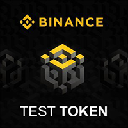-
 Bitcoin
Bitcoin $95,664.6533
0.58% -
 Ethereum
Ethereum $1,799.2831
-1.45% -
 Tether USDt
Tether USDt $0.9999
0.01% -
 XRP
XRP $2.1428
-0.10% -
 BNB
BNB $602.0288
0.44% -
 Solana
Solana $146.1916
-0.70% -
 USDC
USDC $1.0000
0.01% -
 Dogecoin
Dogecoin $0.1707
-0.52% -
 Cardano
Cardano $0.6695
0.38% -
 TRON
TRON $0.2454
-1.57% -
 Sui
Sui $3.3003
-3.82% -
 Chainlink
Chainlink $13.6719
-0.19% -
 Avalanche
Avalanche $19.8885
0.32% -
 Stellar
Stellar $0.2619
0.64% -
 UNUS SED LEO
UNUS SED LEO $8.7285
0.34% -
 Toncoin
Toncoin $3.0142
1.32% -
 Shiba Inu
Shiba Inu $0.0...01263
-1.41% -
 Hedera
Hedera $0.1759
1.04% -
 Bitcoin Cash
Bitcoin Cash $362.1289
2.48% -
 Hyperliquid
Hyperliquid $20.8499
2.85% -
 Litecoin
Litecoin $85.7762
2.51% -
 Polkadot
Polkadot $3.9389
-0.15% -
 Dai
Dai $1.0002
0.01% -
 Monero
Monero $285.9881
3.97% -
 Bitget Token
Bitget Token $4.2670
-0.83% -
 Ethena USDe
Ethena USDe $1.0005
0.01% -
 Pi
Pi $0.5783
-1.61% -
 Pepe
Pepe $0.0...07938
-0.75% -
 Bittensor
Bittensor $364.6926
-3.15% -
 Uniswap
Uniswap $4.8987
-2.02%
How to trade LINK coins to others? Graphic tutorial on selling LINK coins
To trade LINK coins, you can choose between cryptocurrency exchanges, such as Binance, or peer-to-peer (P2P) platforms, such as LocalBitcoins, depending on the desired trading volume and level of security required.
Oct 14, 2024 at 12:00 am

How to trade LINK coins to others: A comprehensive guide
Chainlink (LINK) is a decentralized oracle network that provides real-world data to smart contracts on the blockchain. LINK is the native token of the Chainlink network and is used to pay for oracle services. If you want to trade LINK coins with others, you can do so through a cryptocurrency exchange or a peer-to-peer (P2P) platform.
Trading LINK coins through a cryptocurrency exchange
- Choose a cryptocurrency exchange. There are many cryptocurrency exchanges that allow you to trade LINK coins. Some of the most popular exchanges include Binance, Coinbase, and Kraken.
- Create an account on the exchange. Once you have chosen an exchange, you will need to create an account. This will involve providing your name, email address, and other personal information.
- Deposit LINK coins into your account. Once you have created an account, you will need to deposit LINK coins into your account. You can do this by sending LINK coins from another wallet or by purchasing LINK coins on the exchange.
- Place a trade order. Once you have LINK coins in your account, you can place a trade order. This will involve specifying the amount of LINK coins you want to trade and the price you want to trade them for.
- Wait for your trade order to be filled. Once you have placed a trade order, you will need to wait for your order to be filled. This can take anywhere from a few seconds to a few minutes.
- Withdraw your LINK coins. Once your trade order has been filled, you can withdraw your LINK coins from the exchange. You can do this by sending LINK coins to another wallet or by selling LINK coins on the exchange.
Trading LINK coins through a peer-to-peer (P2P) platform
- Choose a P2P platform. There are many P2P platforms that allow you to trade LINK coins with others. Some of the most popular P2P platforms include LocalBitcoins, Paxful, and Bisq.
- Create an account on the P2P platform. Once you have chosen a P2P platform, you will need to create an account. This will involve providing your name, email address, and other personal information.
- Find a trade partner. Once you have created an account, you will need to find a trade partner. You can do this by browsing the list of available trades or by posting your own trade offer.
- Negotiate the terms of the trade. Once you have found a trade partner, you will need to negotiate the terms of the trade. This will involve agreeing on the price of the LINK coins, the payment method, and the delivery method.
- Complete the trade. Once you have agreed on the terms of the trade, you will need to complete the trade. This will involve sending the LINK coins to the other party and receiving payment.
Tips for trading LINK coins
- Do your research. Before you trade LINK coins, it is important to do your research. This will help you understand the risks involved and make informed decisions.
- Start small. When you are first starting out, it is best to start small. This will help you get a feel for the market and avoid losing too much money.
- Be patient. Trading LINK coins can be a slow process. Do not expect to get rich quick.
- Follow the market. It is important to follow the market to stay up-to-date on the latest news and trends. This will help you make better trading decisions.
- Use a reputable exchange or P2P platform. When you are trading LINK coins, it is important to use a reputable exchange or P2P platform. This will help you protect your funds and avoid scams.
Disclaimer:info@kdj.com
The information provided is not trading advice. kdj.com does not assume any responsibility for any investments made based on the information provided in this article. Cryptocurrencies are highly volatile and it is highly recommended that you invest with caution after thorough research!
If you believe that the content used on this website infringes your copyright, please contact us immediately (info@kdj.com) and we will delete it promptly.
- Pre-market purchase of Melania Trump's memecoin netted millions in profit for crypto traders
- 2025-05-07 06:35:12
- Democratic Sen. Chris Murphy Introduces Bill to Bar Presidents and Lawmakers From Launching Cryptocurrencies
- 2025-05-07 06:35:12
- A heated dispute has emerged within the Bitcoin developer and user community over a proposal to remove or loosen limits on OP_RETURN
- 2025-05-07 06:30:12
- A small group of traders made a staggering $99.6 million in profit
- 2025-05-07 06:30:12
- Don't Miss These 3 Breakout Tokens, Featuring One Top Meme Coin Presale to Buy Now
- 2025-05-07 06:25:12
- Virtuals Protocol (VIRTUAL) Is Down 15% in the Last 24 Hours After Rallying 200% Over the Past 30 Days
- 2025-05-07 06:25:12
Related knowledge

BSV transaction fees suddenly increased? How to adjust the handling fee to save costs?
May 02,2025 at 06:42am
Understanding BSV Transaction FeesBSV (Bitcoin SV) aims to fulfill the original vision of Bitcoin as a peer-to-peer electronic cash system. One of the key elements in this system is the transaction fee, which compensates miners for including transactions in the blockchain. Recently, users have noticed a sudden increase in BSV transaction fees, which can...

Does BSV transaction require real-name authentication? Is anonymous trading feasible?
May 03,2025 at 03:14pm
The question of whether BSV (Bitcoin SV) transactions require real-name authentication and whether anonymous trading is feasible is a complex one, deeply intertwined with the broader dynamics of cryptocurrency regulations and blockchain technology. Let's delve into these aspects to provide a comprehensive understanding. Understanding BSV and Its Transac...

How to solve the high slippage of BSV transactions? How to choose between limit and market orders?
May 02,2025 at 09:01pm
High slippage can be a significant concern for traders dealing with Bitcoin SV (BSV) transactions. Slippage refers to the difference between the expected price of a trade and the price at which the trade is actually executed. This can occur in fast-moving markets or when there is low liquidity. To address this issue, understanding the mechanics of slipp...

What if BSV transactions are frozen? How to contact customer service to unblock the account?
May 05,2025 at 05:01am
When dealing with Bitcoin SV (BSV) transactions, encountering issues such as frozen transactions can be a stressful experience. This article will guide you through the process of understanding why BSV transactions might be frozen and how to contact customer service to unblock your account. We will cover the reasons behind frozen transactions, steps to t...

What if BSV node synchronization is slow? How to optimize local wallet performance?
May 03,2025 at 04:35pm
When dealing with BSV (Bitcoin SV) node synchronization and optimizing local wallet performance, it's crucial to understand the underlying issues and implement effective solutions. Slow synchronization and poor wallet performance can significantly hinder your experience with the BSV network. This article will delve into the reasons behind slow BSV node ...

How to check BSV transaction records? How to use the blockchain browser?
May 03,2025 at 06:50am
Checking BSV (Bitcoin SV) transaction records and using a blockchain browser are essential skills for anyone involved in the cryptocurrency space. These tools allow you to verify transactions, check wallet balances, and understand the flow of funds on the blockchain. This article will guide you through the process of checking BSV transaction records and...

BSV transaction fees suddenly increased? How to adjust the handling fee to save costs?
May 02,2025 at 06:42am
Understanding BSV Transaction FeesBSV (Bitcoin SV) aims to fulfill the original vision of Bitcoin as a peer-to-peer electronic cash system. One of the key elements in this system is the transaction fee, which compensates miners for including transactions in the blockchain. Recently, users have noticed a sudden increase in BSV transaction fees, which can...

Does BSV transaction require real-name authentication? Is anonymous trading feasible?
May 03,2025 at 03:14pm
The question of whether BSV (Bitcoin SV) transactions require real-name authentication and whether anonymous trading is feasible is a complex one, deeply intertwined with the broader dynamics of cryptocurrency regulations and blockchain technology. Let's delve into these aspects to provide a comprehensive understanding. Understanding BSV and Its Transac...

How to solve the high slippage of BSV transactions? How to choose between limit and market orders?
May 02,2025 at 09:01pm
High slippage can be a significant concern for traders dealing with Bitcoin SV (BSV) transactions. Slippage refers to the difference between the expected price of a trade and the price at which the trade is actually executed. This can occur in fast-moving markets or when there is low liquidity. To address this issue, understanding the mechanics of slipp...

What if BSV transactions are frozen? How to contact customer service to unblock the account?
May 05,2025 at 05:01am
When dealing with Bitcoin SV (BSV) transactions, encountering issues such as frozen transactions can be a stressful experience. This article will guide you through the process of understanding why BSV transactions might be frozen and how to contact customer service to unblock your account. We will cover the reasons behind frozen transactions, steps to t...

What if BSV node synchronization is slow? How to optimize local wallet performance?
May 03,2025 at 04:35pm
When dealing with BSV (Bitcoin SV) node synchronization and optimizing local wallet performance, it's crucial to understand the underlying issues and implement effective solutions. Slow synchronization and poor wallet performance can significantly hinder your experience with the BSV network. This article will delve into the reasons behind slow BSV node ...

How to check BSV transaction records? How to use the blockchain browser?
May 03,2025 at 06:50am
Checking BSV (Bitcoin SV) transaction records and using a blockchain browser are essential skills for anyone involved in the cryptocurrency space. These tools allow you to verify transactions, check wallet balances, and understand the flow of funds on the blockchain. This article will guide you through the process of checking BSV transaction records and...
See all articles




















































































